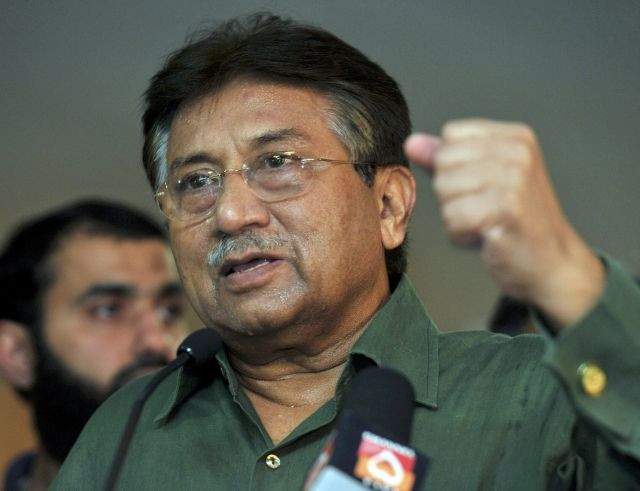Pakistan Election Madness: Musharraf Placed Under Arrest, But Freely Walks Out Of Court, While Police Deny Imran Khan’s Claim His House Was Attacked

Pakistan's chaotic and endlessly entertaining general election continues to provide crazy new adventures to feast upon. In the latest chapter of this tragicomedy, former President and army chief Pervez Musharraf (who has already been disqualified for running again for any office) is now facing an arrest order from the Islamabad High Court.
Musharraf, who seized power in Pakistan in a coup in 1999 and lasted until 2008 before he went into self-imposed exile in Dubai and London, had sought to run in the May 2013 elections in order to ”save” the country.
Now, he is technically a fugitive from justice.
The arrest order is related to steps Musharraf took during a period of emergency rule in 2007, including the house arrest of more than 60 judges. He also faces a number of other criminal charges, including treason and negligence in connection with failing to provide enough security to protect the life of former Prime Minister Benazir Bhutto during her own return to Pakistan from self-imposed exile in late 2007. (She was assassinated while making a campaign appearance in the city of Rawalpindi).
After appearing at the court when the judges issued the order, Musharraf and his security detail simply exited the courthouse (with no attempt by a large contingent police to arrest him, despite the order).
BBC reported additionally that authorities in Islamabad have apparently made no attempt to arrest Musharraf at the farmhouse he is staying in outside the city.
But this is Pakistan after all.
Later, in a statement released to the press, Musharraf described the arrest order as "ill-conceived and unwarranted judicial activism" and "seemingly motivated by personal vendettas."
Musharraf’s attorneys will appeal the order before the Supreme Court.
M. Ilyas Khan, a BBC correspondent in Islamabad, wrote that Musharraf’s arrest order placed the Pakistani military in a conundrum.
“[The military] does not want to be seen to be interventionist, but would surely be concerned about the fate of one of its former chiefs,” he wrote.
“If [Musharraf] is arrested, the government may decide to detain him at his residence instead of sending him to prison. It would be the first time a former military ruler has met such a fate. But to many it would also make Mr. Musharraf look like a victim, especially when he was barred from standing in elections just days ago.”
Ali Dayan Hasan, Pakistan director at Human Rights Watch, blasted the state’s failure to arrest Musharraf.
“[This] underscores [Musharraf’s] disregard for due legal process and indicates his assumption that as a former army chief and military dictator he can evade accountability for abuses,” Hasan said in a statement.
“It is essential that Pakistan’s military authorities which are protecting the former dictator comply with the Islamabad High Court’s orders and ensure that he presents himself for arrest.”
Hasan added that “continued military protection for General Musharraf will make a mockery of claims that Pakistan’s armed forces support the rule of law and bring the military further disrepute that it can ill afford.”
Even if the authorities never arrest Musharraf, he also faces a death sentence from the Pakistan Taliban, which has vowed to kill him for supporting the U.S. government in its military efforts against their compatriots in neighboring Afghanistan.
Returning to exile in Dubai or London would also prove difficult since a court has also barred him from leaving Pakistan.
Meanwhile, it is unclear who will lead Musharraf’s All Pakistan Muslim League (APML) political party in next month’s election.
Another prominent would-be future leader of Pakistan has his own bizarre troubles.
Imran Khan, the former cricket star who is now the head of the Pakistan Tehrik-i-Insaaf (PTI) party, claimed that his hilltop villa in Islamabad was attacked on Wednesday by “a horde of 100 miscreants,” who also beat up his brother-in-law.
PTI officials accused the government of failing to provide adequate security for Khan.
Shireen Mazari, a senior PTI official, even demanded the resignation of the interior minister for endangering Khan’s life.
“The resultant attack on his house by a horde of 100 miscreants on Wednesday evening put his and his family’s lives at risk while the police and local administration did not respond despite repeated calls,” she said in a statement.
“Imran’s brother-in-law was beaten and his female family members abused as his gate was broken and the hordes reached his house because no police protection was provided despite repeated demands.”
However, police officials in Islamabad denied that any such incident took place.
Islamabad police chief Bani Amin told Agence France Presse: “No report has been registered. If anything has happened at Imran Khan’s home, it may have been because of his workers who are demonstrating at his house for party tickets.”
© Copyright IBTimes 2025. All rights reserved.





















